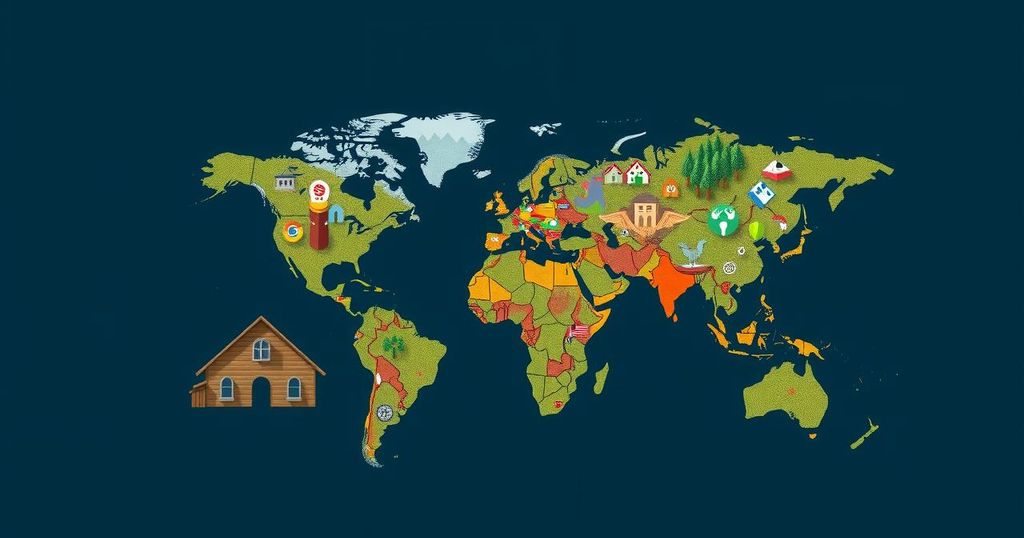Strengthening Climate Resilience Through Sustainable Development Strategies
The World Bank Group report highlights the significant risk posed by climate change to 1.2 billion people. It emphasizes the role of sustainable development in reducing economic losses and improving resilience, noting that a 10% GDP per capita increase could alleviate the vulnerability of 100 million individuals. Successful adaptation strategies from countries like India, Niger, and Bangladesh serve as models for effective responses to climate hazards.
Climate change presents significant hazards globally, impacting approximately 1.2 billion individuals through threats such as heatwaves, floods, hurricanes, and droughts. A recent report by the World Bank Group reveals that advancing sustainable development could mitigate economic losses linked to climate change significantly. Titled “Rising to the Challenge: Success Stories and Strategies for Achieving Climate Adaptation and Resilience,” the report underscores the need for accelerated development and targeted adaptation methodologies. This report highlights that a modest 10% increase in GDP per capita could potentially reduce the vulnerable population by around 100 million, showcasing the importance of climate-informed policies to enhance overall community resilience. To systematically enhance climate resilience, it is essential to tailor development policies to the particular conditions of each nation. Affluent countries are encouraged to upgrade their existing infrastructures to better withstand climate impacts, while lower-income nations have a unique opportunity to construct sustainable infrastructures from the outset. The World Bank Group is actively engaged in addressing these varied challenges across multiple sectors, including food and agriculture, water management, ecosystems, infrastructure, and social safety nets. Their initiatives aim to enhance community preparedness against climate disruptions, focusing on improved early warning systems, increased access to insurance, and timely healthcare responses in crisis situations. For the first instance, the World Bank has instituted a Corporate Scorecard to monitor progress concerning its climate interventions. This scorecard will serve as a vital benchmark for accountability, measuring the organization’s effectiveness in eradicating extreme poverty while promoting shared prosperity within the context of a changing climate. The report also showcases successful examples of global climate adaptation efforts. In India, the Ahmedabad Heat Action Plan notably integrates early warning systems with community engagement, yielding a notable decrease in heatstroke fatalities. Niger’s adaptive social protection initiative has successfully provided financial assistance during droughts, thereby enhancing food security and overall community wellness. Moreover, improved weather forecasting in Bangladesh has led to significant reductions in agricultural losses during storms. Across different regions, private utilities are increasingly integrating climate risk considerations into their operational strategies, utilizing nature-based solutions to ensure the reliability of electricity services. These case studies serve as compelling evidence that effective climate adaptation is achievable and can foster resilient communities amid adversity.
The article addresses the pressing issue of climate change and its impact on global populations, focusing on the latest findings from a World Bank Group report. This report indicates that approximately 1.2 billion people face significant risks from climate hazards, highlighting the urgent need for sustainable development strategies. It outlines specific approaches that countries can adopt to bolster their resilience and mitigate the adverse effects of climate change, emphasizing tailored policies and the importance of increasing GDP per capita.
In summary, the World Bank Group’s report illustrates the critical connection between sustainable development and climate resilience. By recognizing how increased GDP per capita can significantly reduce vulnerability, and advocating for climate-informed policies adapted to specific national contexts, the report offers a roadmap for governments worldwide. Successful examples from various countries further demonstrate that effective climate adaptation strategies are not only feasible but also essential for building thriving communities amidst the challenges posed by climate change.
Original Source: www.openaccessgovernment.org




Post Comment